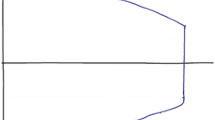Abstract
We discuss Lagrange multiplier rules from a variational perspective. This allows us to highlight many of the issues involved and also to illustrate how broadly an abstract version can be applied.


Similar content being viewed by others
Notes
We are assuming that f is everywhere finite, if not we must also require that \(f({\hat{x}}) < +\infty \).
The use of the term “primal” is much more recent than the term “dual” and was suggested by George Dantzig’s father Tobias when linear programming was being developed in the 1940s.
In infinite dimensions, we also assume that f, g are lsc and that A is continuous.
Actually this term arises because in the Boltzmann–Shannon case one is minimizing the negative of the entropy.
Since \(\gamma _{C_1}(x)-1<0\) for \(x\in \mathrm{int}C_1\), \(\lambda \ne 0\).
References
Borwein, J.M., Zhu, Q.J.: Techniques of Variational Analysis. Springer, New York (2005)
Gale, D.: A geometric duality theorem with economic applications. Rev. Econ. Stud. 34, 19–24 (1967)
Goldstine, H.H.: A History of the Calculus of Variations from the 17th through 19th Century. Springer, New York (1980)
Gregory, J., Lin, C.: Constrained Optimization in the Calculus of Variations and Optimal Control Theory. Chapman and Hall, London (1992)
Hanca, J., Taylor, E.F.: From conservation of energy to the principle of least action: a story line. Am. J. Phys. 72, 514–521 (2004)
Weinstock, R.: Calculus of Variations with Applications to Physics and Engineering. Dover, Mineola (1974)
Benoist, J., Borwein, J.M., Popovici, N.: A characterization of quasiconvex vector-valued functions. Proc. AMS 131, 1109–1113 (2002)
Borwein, J.M.: Generalized linear complementary problems treated without fixed point theorem. JOTA 43, 343–356 (1984)
Borwein, J.M., Zhu, Q.J.: Viscosity solutions and viscosity subderivatives in smooth Banach spaces with applications to metric regularity. SIAM J. Control Optim. 34, 1568–1591 (1996)
Borwein, J.M., Ioffe, A.D.: Proximal analysis in smooth Banach spaces. Set-valued Anal. 4, 1–24 (1996)
Spivak, M.: Calculus on Manifolds: A Modern Approach to Classical Theorem of Advanced Calculus, 4th edn. Publish or Perish, Berkeley (2008)
Warga, J.: Optimal Control of Differential and Functional Equations. Academic Press, Salt Lake City, UT (1973)
Giannessi, F.: Constrained Optimization and Image Space Analysis I. Springer, New York (2005)
Rockafellar, R.T.: Lagrange multipliers and optimality. SIAM Rev. 35, 183–238 (1993)
Avakov, E.R., Magaril-Il’yaev, G.G., Tikhomirov, V.M.: Lagrange’s principle in extremum problems with constraints. Russian Math. Surv. 68, 401–433 (2013)
Ioffe, A.D., Tikhomirov, V.M.: Theory of Extremal Problems. North-Holland Publishing Co., Amsterdam (1979)
Magaril-Il’yaev, G.G., Tikhomirov, V.M.: Newton’s method, differential equations, and the Lagrangian principle for necessary extremum conditions. Proc. Steklov Inst. Math. 262, 149–169 (2008)
Mordukhovich, B.S.: Variational Analysis and Generalized Differentiation I, II. Springer, New York (2006)
Penot, J.-P.: Calculus Without Derivatives. Springer, New York (2014)
Borwein, J.M., Zhuang, D.: On Fan’s minimax theorem. Math. Program. 34, 232–234 (1986)
Shapiro, A., Nemirovski, A.: Duality of linear conic problems. School of Industrial and Systems Engineering, Georgia Institute of Technology, Atlanta, GA (2003). http://www.optimization-online.org/DB_HTML/2003/12/793.html
Zǎlinescu, C.: On duality gaps in linear conic problems. School of Industrial and Systems Engineering, Georgia Institute of Technology, Atlanta, GA (2010). http://www.optimization-online.org/DB_HTML/2010/09/2737.html
Clarke, F.H.: Optimization and Nonsmooth Analysis. Canadian Mathematical Society Series of Monographs and Advanced Texts. Wiley, New York (1983)
Demyanov, V.F., Vasilev, and L.V.: Nondifferentiable Optimization. (Translations Series in Mathematics and Engineering). Springer, New York (1986)
Borwein, J.M., Treiman, J.S., Zhu, Q.J.: Necessary conditionsfor constrained optimization problem with semicontinuous andcontinuous data. Trans. AMS 350, 2409–2429 (1998)
Borwein, J.M., Zhu, Q.J.: A survey of subdifferential calculus with applications. Nonlinear Anal.: TMA 38, 687–773 (1999)
Nghia, T.T.A.: A nondegenerate fuzzy optimality condition for constrained optimization problems without qualification conditions. Nonlinear Anal. 75, 6379–6390 (2012)
Zhu, Q.J.: Necessary conditions for constrained optimization problem in smooth Banach spaces with applications. SIAM J. Optim. 12, 1032–1047 (2002)
Mangasarian, O.L., Fromovitz, S.: The Fritz John necessary conditions in the presence of equality and inequality constraints. J. Math. Anal. Appl. 17, 37–47 (1967)
Kruger, A.Y., Minchenko, L., Outrata, J.V.: On relaxing the Mangasarian–Fromovitz constraint qualification. Positivity 18, 171–189 (2014)
Borwein, J.M.: Convex relations in optimization and analysis. In: Schaible, S., Ziemba, W.T. (eds.) Generalized Convexity inOptimization and Economics, pp. 335–377. Academic Press, London (1981)
Borwein, J.M.: Maximum entropy and feasibility methods for convex and non-convex inverse problems. Optimization 61, 1–33 (2012). doi:10.1080/02331934.2011.632502
Borwein, J.M., Lewis, A.S.: Convex Analysis and Nonlinear Optimization, 2 (2005) edn. Springer, New york (2000)
Ioffe, A.D., Levin, V.L.: Subdifferentials of convex functions. Trudy Mosk. Mat. Obšč 26, 3–73 (1972)
Borwein, J.M.: A very complicated proof of the minimax theorem. Minimax Theory and its Applications, vol. 1 (2015)
Jameson, G.J.O.: Topology and Normed Spaces. Chapman and Hall, London (1974)
Luenberger, D.G.: Optimization by Vector Space Methods. Wiley, Hoboken (1972)
Rockafellar, R.T., Wolenski, P.R.: Convexity in Hamilton–Jacobi theory 1: dynamics and duality. SIAM J. Control Optim. 40, 1323–1350 (2001)
Acknowledgments
The research is partially supported by an Australian Research Council Discovery Projects grant. We thank several of our colleagues for helpful input during the preparation of this work. We especially thank the referee whose incisive and detailed comments have substantially improved the final version of our manuscript.
Author information
Authors and Affiliations
Corresponding author
Rights and permissions
About this article
Cite this article
Borwein, J.M., Zhu, Q.J. A Variational Approach to Lagrange Multipliers. J Optim Theory Appl 171, 727–756 (2016). https://doi.org/10.1007/s10957-015-0756-2
Received:
Accepted:
Published:
Issue Date:
DOI: https://doi.org/10.1007/s10957-015-0756-2



